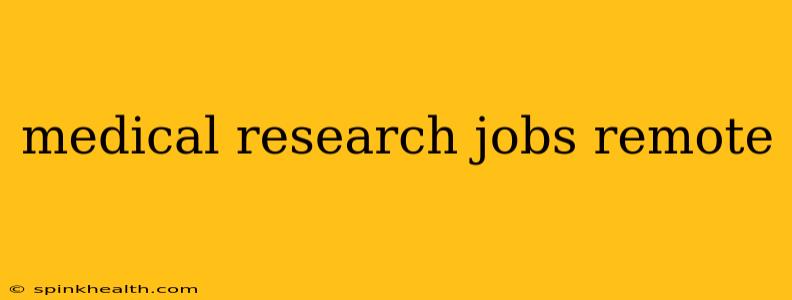Unlocking a World of Remote Medical Research Opportunities: A Journey into Flexible Careers
The hum of the lab, the scent of antiseptic – these are the images often conjured when we think of medical research. But the reality is evolving. A quiet revolution is underway, offering a world of remote medical research jobs, blurring geographical boundaries and opening doors to a more flexible, fulfilling career path. This isn't just about working from home; it's about accessing opportunities previously unimaginable, regardless of your location or life circumstances.
Let's embark on a journey to explore this exciting landscape. We'll delve into the types of roles available, the skills and qualifications needed, and answer some frequently asked questions surrounding this burgeoning field.
What types of remote medical research jobs are available?
The beauty of remote medical research is its diversity. It's not just confined to data entry or administrative tasks. While these roles exist, the possibilities extend far beyond. Imagine contributing to groundbreaking studies without ever setting foot in a traditional lab. Here are just a few examples:
-
Data Scientists and Analysts: Sifting through vast datasets, identifying trends, and building predictive models are crucial to medical research. This work is often perfectly suited for a remote setting, requiring powerful computers and robust internet connections, but not necessarily a physical laboratory.
-
Medical Writers and Editors: Communicating complex research findings clearly and concisely is vital. Remote medical writers and editors play a crucial role in shaping publications, grant proposals, and other vital documents. Their work can be accomplished from anywhere with a stable internet connection.
-
Biostatisticians: Designing and analyzing statistical studies is another crucial area where remote work thrives. These professionals utilize advanced statistical software and techniques to interpret complex biological data, often entirely remotely.
-
Clinical Research Coordinators (CRCs): While some CRC tasks require on-site presence, many aspects – such as data management, regulatory compliance, and communication with study participants – can be handled remotely. This is particularly true for studies with geographically dispersed participants.
-
Regulatory Affairs Specialists: Ensuring compliance with various regulations is critical. These specialists often work remotely, reviewing documents, preparing submissions, and interacting with regulatory agencies electronically.
What skills and qualifications do I need for a remote medical research job?
The specific requirements vary depending on the role. However, some transferable skills are highly valued across the board:
-
Strong analytical skills: The ability to interpret data, identify trends, and draw meaningful conclusions is essential across many medical research roles.
-
Proficiency in relevant software: Depending on the role, this might include statistical software (like R or SAS), data management systems, or specialized medical software.
-
Excellent communication skills: Clear and concise written and verbal communication is crucial for collaborating with colleagues, communicating with stakeholders, and presenting research findings.
-
Meticulous attention to detail: Accuracy is paramount in medical research. Attention to detail ensures data integrity and prevents errors.
-
Strong organizational skills: Managing multiple tasks simultaneously and prioritizing effectively is essential, particularly in a remote environment.
How can I find remote medical research jobs?
The search might require a strategic approach. Here are some avenues to explore:
-
Online job boards: Websites specializing in remote work, such as Indeed, LinkedIn, and FlexJobs, often list remote medical research positions.
-
Company websites: Many pharmaceutical companies, research institutions, and biotech firms have online career portals where you can search for remote opportunities.
-
Networking: Attending online conferences and webinars related to medical research can help you connect with professionals in the field and learn about potential job openings.
Are there any downsides to remote medical research jobs?
While the benefits are significant, it's important to acknowledge potential drawbacks:
-
Isolation: Working remotely can sometimes lead to feelings of isolation. It's crucial to actively build and maintain professional connections.
-
Technical difficulties: Reliable internet access and appropriate equipment are essential. Technical issues can disrupt workflow.
-
Limited collaboration: While many tasks can be done remotely, some require in-person collaboration. This might limit opportunities for some specific roles.
The landscape of remote medical research is constantly evolving, presenting incredible opportunities for those seeking flexible, impactful careers. By honing your skills, networking effectively, and understanding the landscape, you can unlock a world of possibilities and contribute to advancements in healthcare from the comfort of your home, or anywhere in the world with a stable internet connection.

